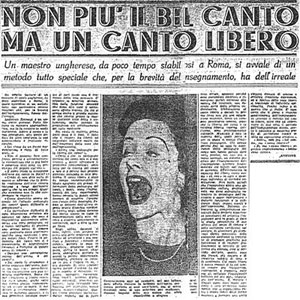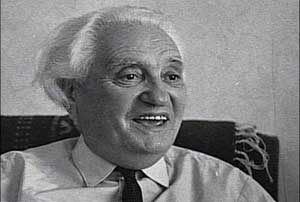by György Sebők
Message In A Bottle 1

I hope that whoever picks up this booklet — this piecing together of the fragments and traces of an extraordinary life — will forgive my borrowing this beautiful title.2 And I hope also that they will overlook my personal tone, which I cannot seem to avoid whenever I think about Lajos Szamosi: the silver-haired old magician, my friend, sometime advisor, often object of my amazement as with good humor, optimism, and the radiance of an inner equilibrium he began countless new lives wherever the storms of this century tossed him.
I knew him in Budapest during the war years, near the beginning of his professional career. There, while working as a teacher of singing, he lived on the margins of society, on the periphery of the music world, where the little provincial private teachers and charlatans operate. From there, he attempted to propagate his beautiful and wise new theories. Even at that time and in that place he was surrounded by a set of fascinating and valuable people: a circle which invariably formed around him wherever he settled down for any length of time.
His students were not equipped with extraordinary vocal abilities. Those young singers who had glorious voices and high promise were naturally attracted to the mainstream, like the man in the fable who seeks treasure not where it lies, but where the light is brightest.
Of course, there were exceptions. Those like Oscar Ascher 3, who owed his voice and speech technique to Lajos Szamosi and who gave him credit whenever he could, or Laszlo Csabai, who had a successful operatic career in America. But the majority of his students were mediocre and, on occasion, substandard. The real miracle was what he managed to achieve with these semi-talents. For years I was witness to a succession of singers with bulging eyes, swollen veins and choked voices who undid their inner knots and managed to turn the limited vocal abilities that they were born with into flexible and natural instruments.

Lajos Szamosi had an investigative mind, one that wanted to understand the whys and wherefores of things. Like all people who think in universal terms, he sought connections between his field and those sciences that attempt to understand and explain human behavior. The theories and discoveries of physics, physiology, and sociology were all a part of his inspiration. On occasion he used these theories to give rational support to his astonishing instincts. Freud, Pavlov, Marx and others colored his thinking in an age when the majority of vocal pedagogy was based on a sterile tradition that had long since degenerated into mere prescription and superstition.
After the war, he started a new life in Bucharest, which I was witness to, then on to Italy, whence he returned to Budapest. There, he continued to fight his solitary battles: the enemy was the same, it had merely adopted a different mask. Finally, in 1957, he started on his last “new life” in Vienna, at an age when others are thinking of hanging up their instruments.
It was in Vienna that his fame began to spread. By that time his students were coming to him from three continents. If that had happened to the young Lajos Szamosi, I would not have to remember him today as that long misunderstood, or not understood, Master. His work, his thinking, would have carved new paths in vocal pedagogy, and beyond its boundaries to the teaching of instrumental music as well. By a quirk of fate I was lucky enough to be one of the few who managed to drink from his fountain in time.
Let us not consider his approach a “method”, because teaching is not theory, but process and action, which, if put down on paper, tends to harden and grow cold. Let us try, instead, to utilize it as if we were historians attempting to piece together the fragments of a vanished life.
1. Written as the preface to a booklet of essays by Lajos Szamosi, published in Hungary in 1990.
2. A reference to the work of Hungary’s most famous humorist/writer, Frigyes Karinthy.
3. A famous Hungarian actor/speaker.

George Sebok
Distinguished Professor of Piano
Indiana University, Bloomington, Indiana
Bloomington, Indiana
January 8, 1989